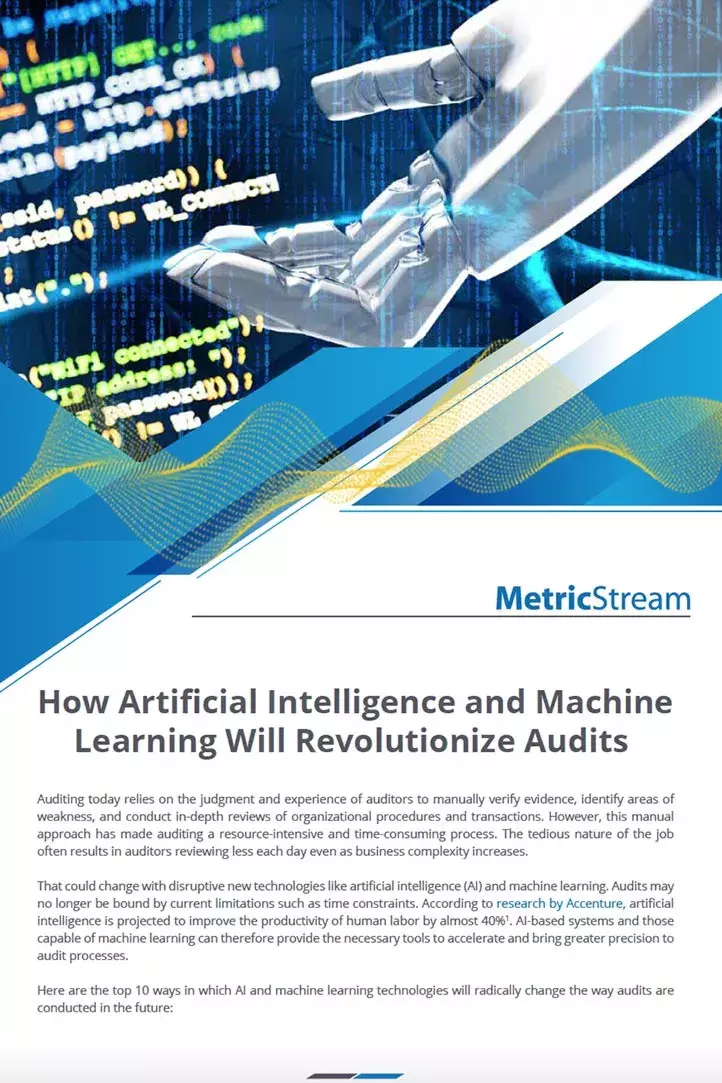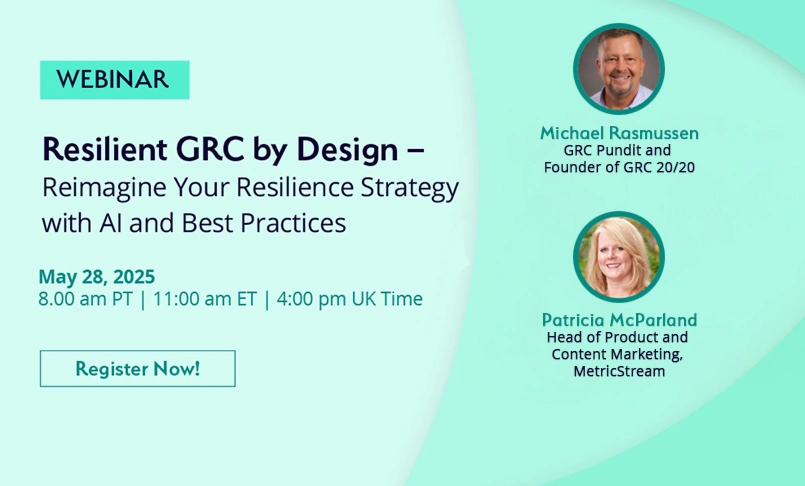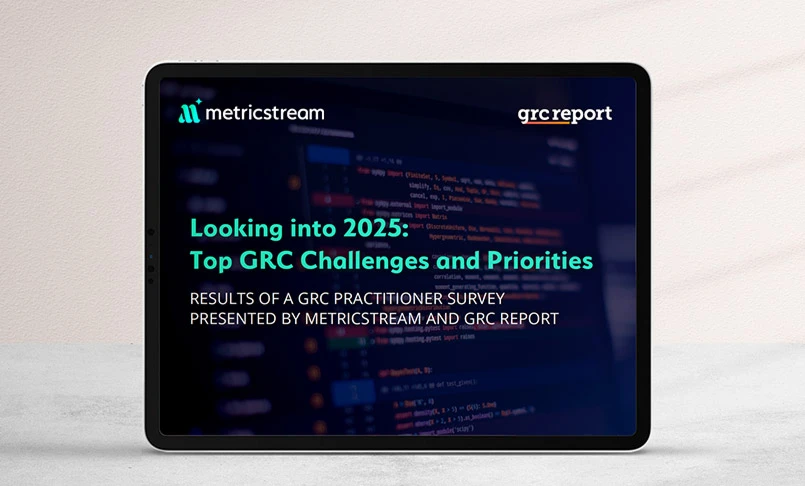
AI-First Connected GRC
Drive a Connected GRC Program for Improved Agility, Performance, and Resilience
Discover Connected GRC Solutions for Enterprise and Operational Resilience
Explore What Makes MetricStream the Right Choice for Our Customers
Discover How Our Collaborative Partnerships Drive Innovation and Success
- Want to become a Partner?
Find Everything You Need to Build Your GRC Journey and Thrive on Risk
Learn about our mission, vision, and core values
How Artificial Intelligence and Machine Learning Will Revolutionize Audits
Auditing today relies on the judgment and experience of auditors to manually verify evidence, identify areas of weakness, and conduct in-depth reviews of organizational procedures and transactions. However, this manual approach has made auditing a resource-intensive and time-consuming process. The tedious nature of the job often results in auditors reviewing less each day even as business complexity increases.
That could change with disruptive new technologies like artificial intelligence (AI) and machine learning. Audits may no longer be bound by current limitations such as time constraints. According to research by Accenture, artificial intelligence is projected to improve the productivity of human labor by almost 40%1. AI-based systems and those capable of machine learning can therefore provide the necessary tools to accelerate and bring greater precision to audit processes

Here are the top 10 ways in which AI and machine learning technologies will radically change the way audits are conducted in the future:
Sampling Will Become Obsolete
Currently, auditors often manually audit an enterprise, and rely on statistical sampling to review hundreds of documents. But with the help of systems capable of machine learning and deep learning, entire sets of documents can be scanned and reviewed. Moreover, the systems processing the information can identify trends and anomalies. This technology is similar to the “fleet learning” system in Tesla’s driverless cars where onboard computers process millions of data points to learn and auto-correct themselves
Evidence Can Be Auto-Verified
Internet of things (IoT) devices with capabilities to sense, detect, and recognize events and individuals have been incorporated in many aspects of an enterprise’s assurance functions. Today, biometric IDs control entry into data centers, while face-recognition software monitors personnel movement within the data center, and log analyzers parse every server’s logs to determine if any privileges have been violated.
For an auditor conducting a SOC2 audit, a system with machine learning capabilities can aggregate data from different monitoring systems to be used as evidence of the performance of tasks. This data can also serve as evidence when logging observations or issues in case systems detect any anomalies in the gathered data.
Control Verification Will Be Proactive
Internet of things (IoT) devices with capabilities to sense, detect, and recognize events and individuals have been incorporated in many aspects of an enterprise’s assurance functions. Today, biometric IDs control entry into data centers, while face-recognition software monitors personnel movement within the data center, and log analyzers parse every server’s logs to determine if any privileges have been violated. For an auditor conducting a SOC2 audit, a system with machine learning capabilities can aggregate data from different monitoring systems to be used as evidence of performance of tasks.
This data can also serve as evidence when logging observations or issues in case systems detect any anomalies in the gathered data. The board relies on audit for assurance as it verifies the quality and authenticity of results produced by enterprise departments. However, traditional audit methods are reactive. AI-based systems could incorporate automated measurement to improve the possibility of predicting expected outcomes, and to instantly verify if the actual values meet the predictions. This approach will create a new form of control verification that is proactive in nature. Audit will then need to step in only if the automated assurance system detects inconsistencies.
More Data Points Will Be Treated as Evidence
Auditors typically focus on the limited evidence that auditees share with them. They then rely on their experience to ask for additional evidence. On the other hand, machine learning and AI-capable systems can extract large amounts of data quickly from textual information, images, voice recordings, etc. Therefore, auditors will no longer need to limit themselves to the evidence provided by auditees. Algorithms such as deep learning can extract meaningful and contextual information from a stream of distinct sources like contracts, conference calls, and emails, which can serve as supporting evidence.
Continuous Auditing Will Be a Reality
An AI-based continuous control monitoring system could examine complete sets of records, and identify control violations. The system could also incorporate a dashboard to prioritize the level of risks of these violations based on the data it is fed.
As new data arrives, the AI system can immediately analyze it, and turn it into actionable information. With algorithms around deep learning, the continuous control monitoring system can reconfigure itself based on the feedback from the previous set of results. This approach can help ensure that controls are designed, configured, and implemented optimally with minimal human intervention.
Auditors Will Morph Into Data Scientists
Although AI-based systems may have the capability to analyze unstructured data, and bring out patterns of information, auditors will need to input the right evaluation parameters. Since it is the auditors who best understand this data, they will need to have the required skill-sets to manage the data effectively, and use data visualization techniques to present the findings to stakeholders.
The role of an auditor will also change from a reviewer to an interpreter of results produced by AI systems.
Explainable AI Will Become Important
While AI and machine learning are being touted as a magic bullet for audit, these systems will need to be fine-tuned to become reliable enough to assist auditors. The systems will also need to be provided with a sizeable amount of data, and their parameters tweaked until they achieve optimal performance. Explainable AI (XAI) will become important so that auditors can understand the workings of the algorithms involved in decision-making, thereby improving trust and transparency in the process.
Audit Reporting Will Become Continuous
Traditional audits generate an audit report that have a categorical grading such as clean, qualified, adverse, etc. With AI and machine learning systems, auditors can use a predictive model to grade various risks on a suitable scale. Doing so will help generate a continuous audit report which can be used to determine positive or negative trends in the area being assessed.
Thus, enterprises can be more agile, adapt quickly to changes, and perform with integrity.
Audit Standards Will Be Redefined
Audit standards will need to be adjusted to incorporate the use of new disruptive technologies. Currently, audit standards are based on traditional auditing procedures which include manual verification, sample-based audits, annual-plan based audits, etc. The new standards will need to consider the advantages of AI that are capable of providing a high level of assurance by examining transactions end to end.
The Institute of Internal Auditors (IIA) is already working on guidelines and frameworks that include the use of AI in audits
Auditors Will Become Strategic Advisors
Historical data on audit issues and findings carry rich information about how a specific issue was addressed, and what the organizational context was. When new issues and findings are logged by audit teams, an AI-based system could run a text analysis of the historical audit information, and share recommendations on similar issues, remedial actions, or references to previous audits where such issues were reported.
Audit teams will then be able to add this intelligence to their findings to help remediation teams resolve the issue faster rather than reinventing the wheel.
The Future Is Here
Artificial intelligence systems with machine learning and deep learning capabilities are no longer technologies of the future anymore, but an impending reality. National Public Radio (NPR), an American non-profit media organization, recently launched an interactive tool that is based on Oxford University’s research on the future of employment4. With an ominous title, “Will Your Job Be Done By A Machine?”, the tool provides telling information on automation in the future: it suggests that the jobs of accountants and auditors have a 93.5% chance of being automated.
In the future, AI systems may automatically design entire audit plans based on the existing evidence through continuous learning algorithms that constantly try to improve the audit process. As audit prepares for this change, it should embrace the opportunities that this new future brings, and evolve to meet its challenges

Subscribe for Latest Updates
Subscribe Now





